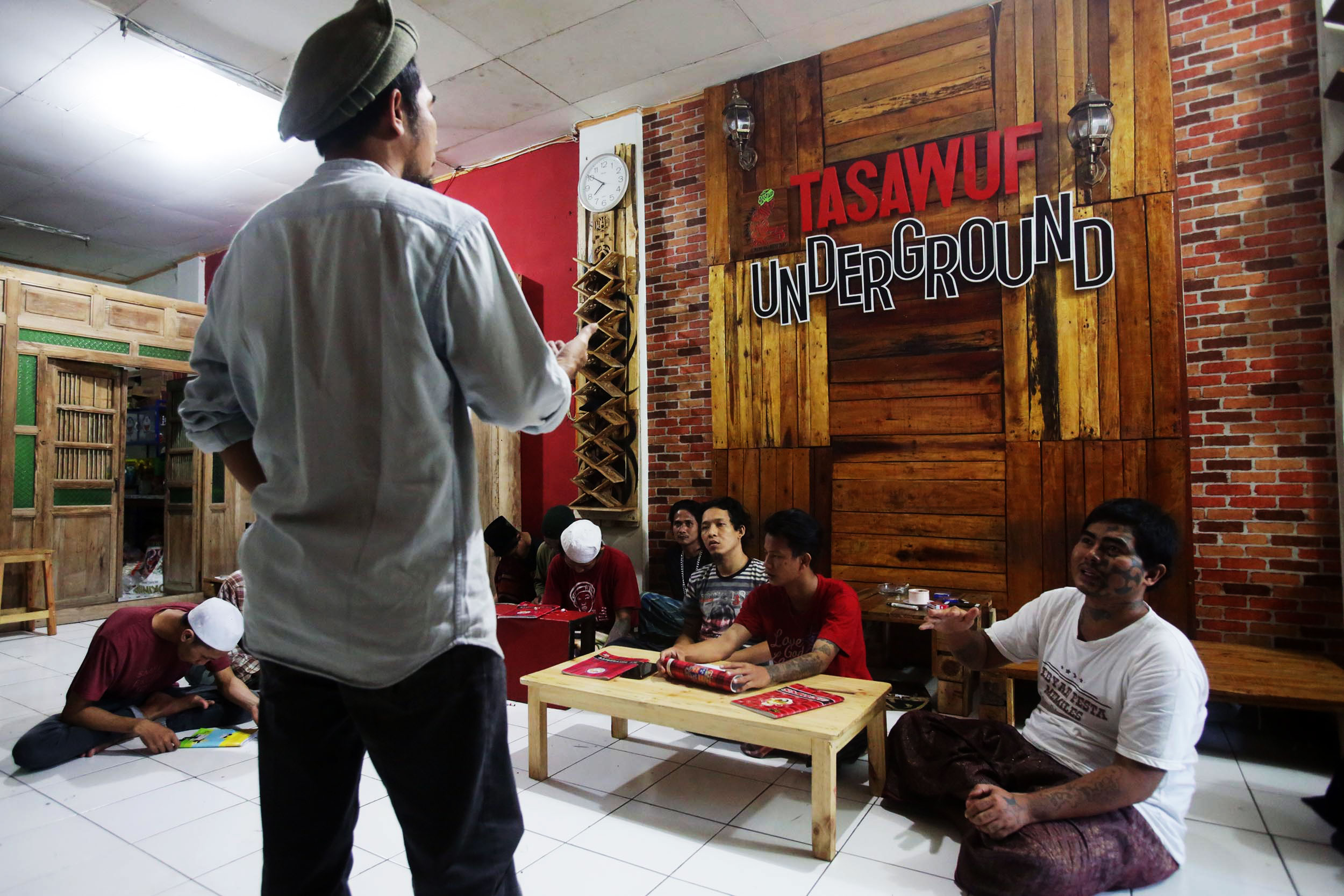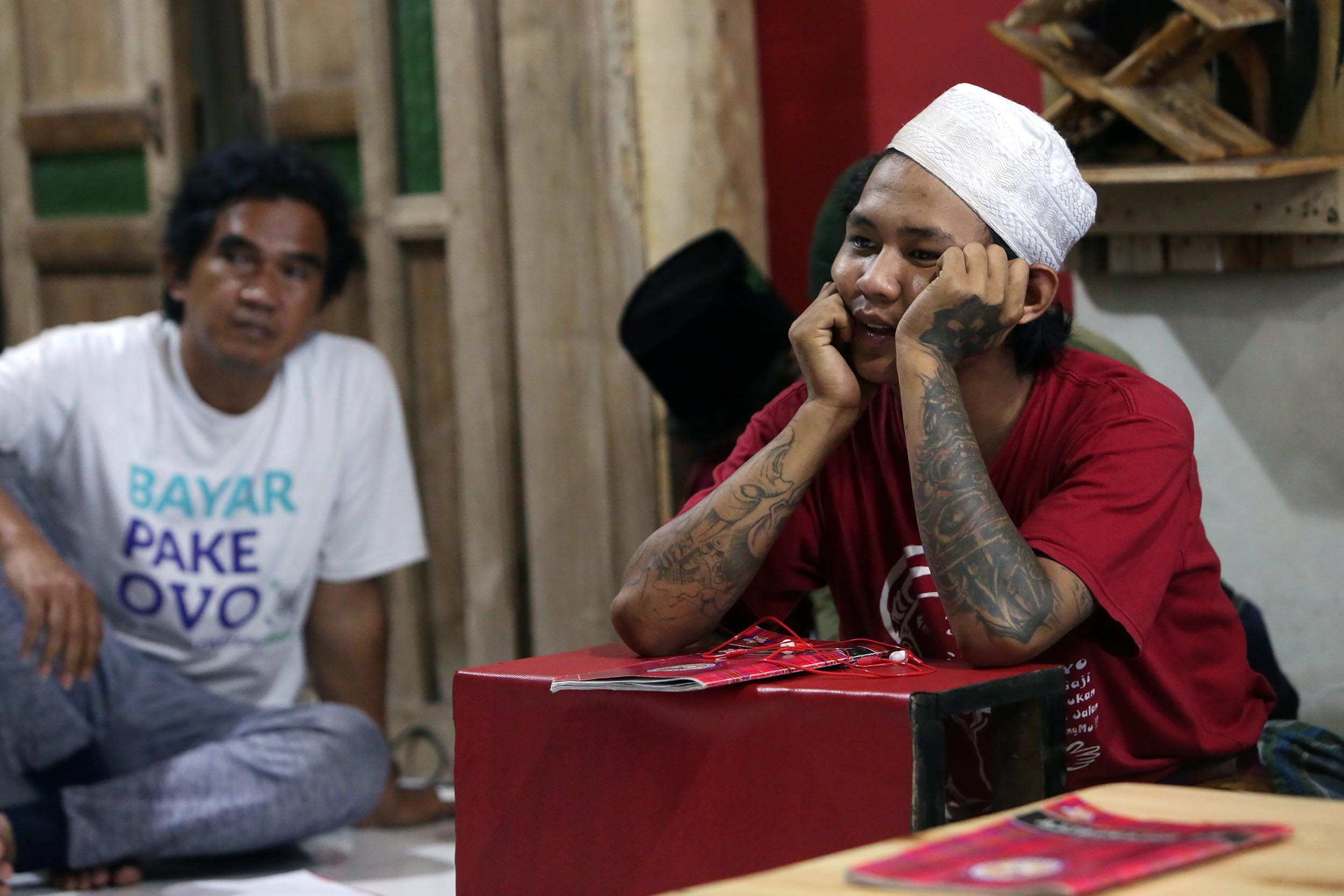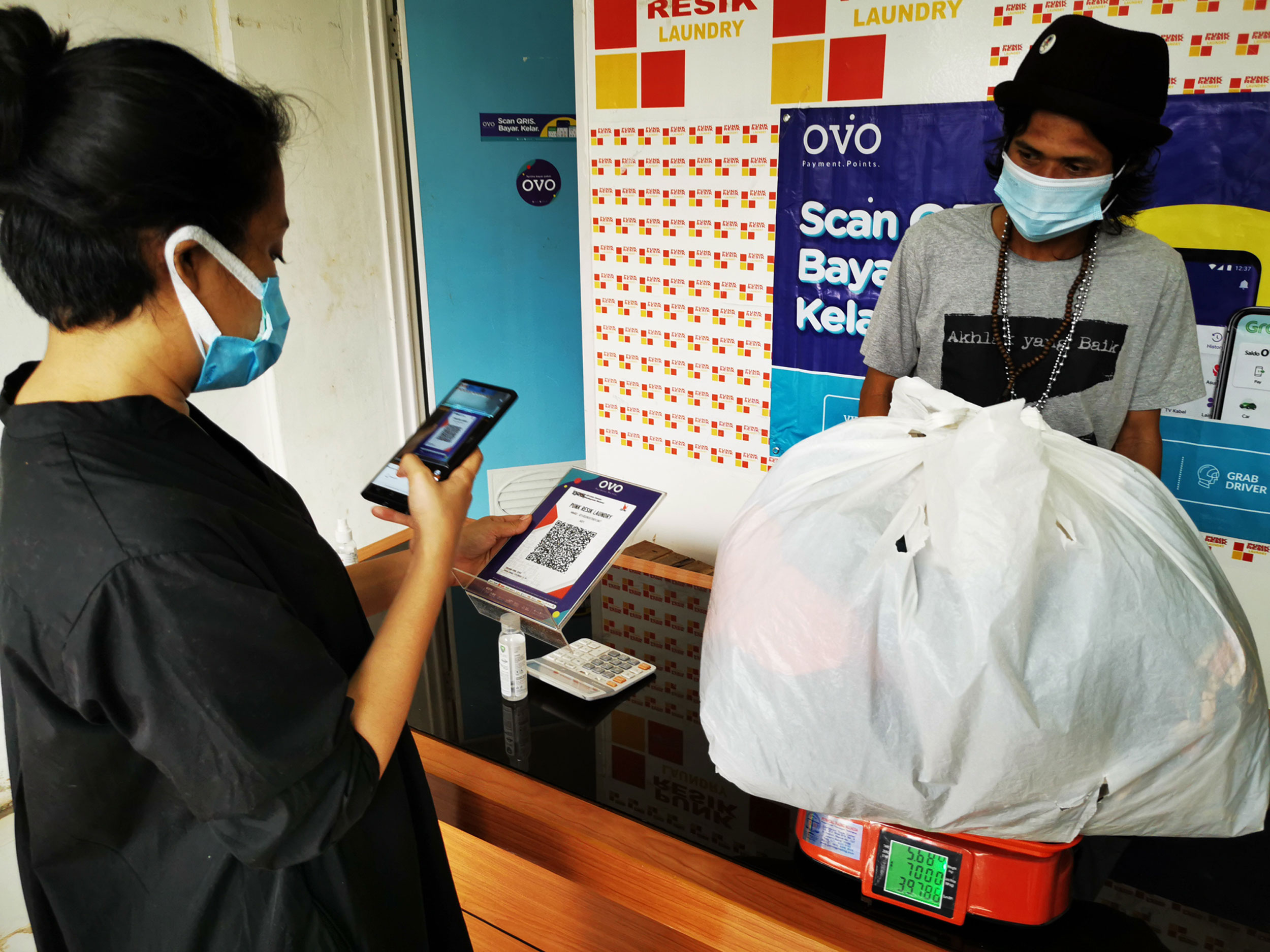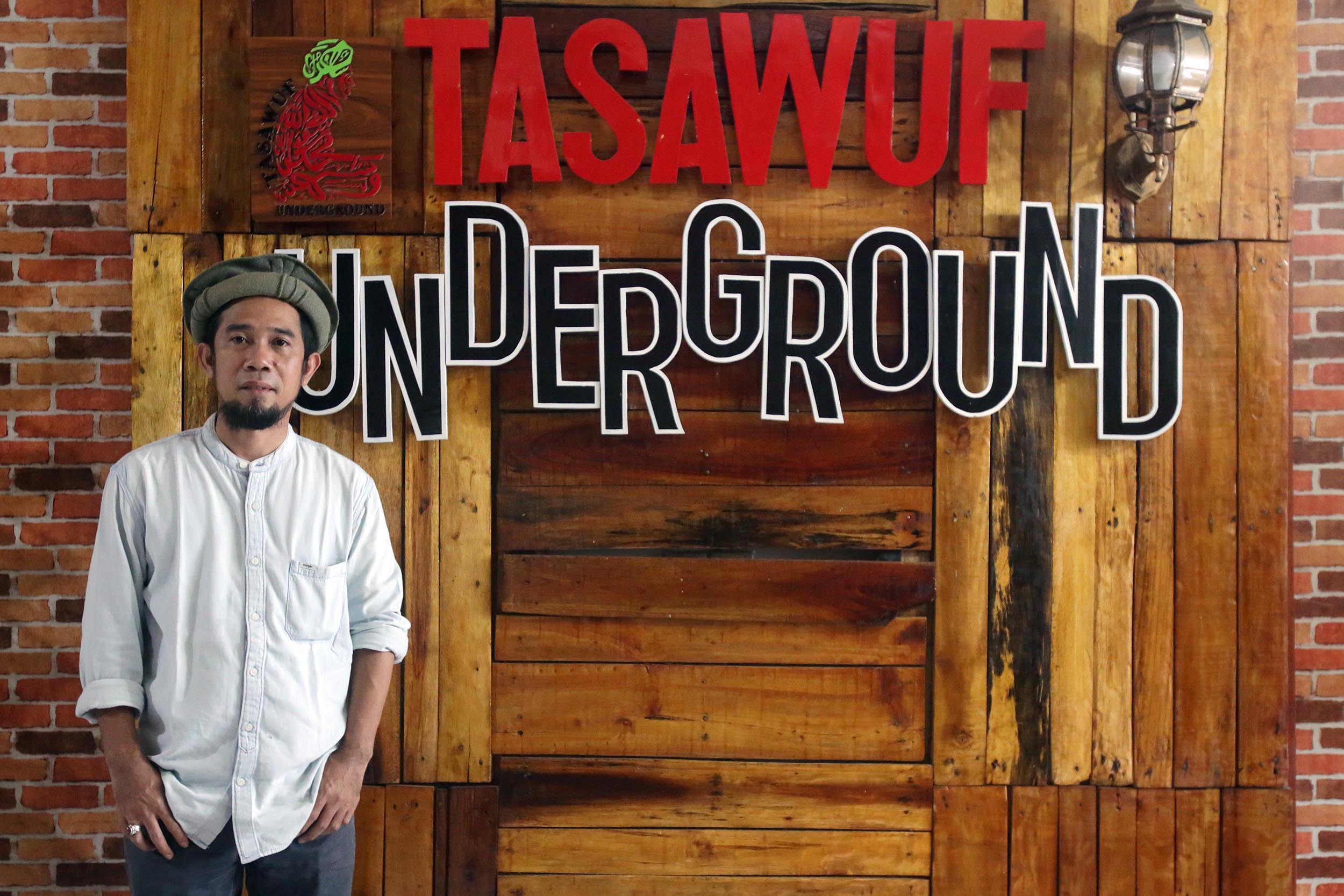For many former punk street youths desperately searching for the elusive chance to improve their lives, the faith-based community Tasawuf Underground in Ciputat, South Tangerang, has become a family they call their own, one where they are finally accepted without judgement.
Ustad (Islamic teacher) Halim Ambiya founded Tasawuf Underground in 2012 after his preconceived notions of the punk subculture were challenged during a trip to Bangkok, Thailand, for an academic discussion. A street riot had broken out and a punk suddenly pulled Halim to safety, helping him hide in an auto repair shop.
The incident prompted Halim to want to better understand the punk street youth community. Upon completing his Masters in Islamic Civilization History at the International Islamic University in Kuala Lumpur, Halim returned to Indonesia and reached out to the punk street youths in Tebet, South Jakarta.
What Halim found was that most of these street youths come from broken homes, with some even having witnessed or experienced domestic violence first-hand.
“I find that to be the greatest factor for these youths becoming rebels. Children from broken families often express their rage by defying their parents or their religious teachers,” he told the The Jakarta Post during an online interview.
Many turn to alcohol and drugs for escape, perpetuating a vicious cycle of poverty and violence. Halim was determined to break that cycle and bring hope, meaning and purpose to the punk community he had come to deeply care for.
Knowing he needed to earn their trust, Halim forged personal connections with the street youths, taking the time to listen to their stories, making them feel understood—many for the first time in their lives.
Tasawuf Underground’s very name reflects this deep understanding. The word tasawuf has its roots in Sufism, a form of Islamic mysticism that emphasizes introspection and a close relationship with God, focusing on spiritual experiences beyond dogma and ritual.
Halim understood that religion was not the oasis it could be for the punk street youths. “How can it? When these youths enter a mosque, the people inside have already judged them by their looks,” said Halim, referring to common punk characteristics like mohawk hairstyles, large earrings and grungy, baggy clothing.
“I wanted to show these punk street youth that religion can also deeply move the human soul. The spiritual experience is the end goal of religion,” explained Halim, who also holds a Bachelor degree in Philosophy from Syarif Hidayatullah Islamic State University (UIN).
“Religion is not simply about wearing the prayer cap or a religious garb. Just changing your clothes; that’s easy,” he added.

The philosophy behind Tasawuf Underground attracted the punk street youths, and the Tasawuf Underground community grew.
Upwards to 120 street youths and volunteers from across Jakarta and the neighboring cities now participate in Tasawuf Underground’s activities, with 25 members of the community living in a pesantren (Islamic boarding school) that Tasawuf Underground opened in 2016.
Halim is thankful that the religious activities have helped these former street youths realize that with their behavior—binge-drinking, substance abuse and brawling—they only ended up harming themselves.
While Halim likes to describe his outreach as a “spiritual homecoming map,” the activities aren’t exclusively religious.
Aside from performing the Islamic prayers and studying the Quran, the former street youths are also encouraged to pursue their education and participate in entrepreneurship training and programs, giving them the incredible gift of socioeconomic empowerment.

A chance at a better life, a chance to give back
As a child, Aan Sujana, 26, would never have even dared to dream that he’d one day be gainfully employed as a community development staffer in Medan, North Sumatra—a position that he secured in part by citing the community development experiences he acquired from his work with the Tasawuf Underground community.
Aan used to spend his days wandering the streets aimlessly with his friends from the Jakarta punk subculture, busking here and there. Homeless and living hand-to-mouth, Aan had no access to either formal or informal education of any kind.
It was when Halim introduced him to the Tasawuf Underground community in 2012 that Aan’s course of life changed. Like so many former street youths under Halim’s wings, after participating in several of the community’s activities, Aan began to see that it was possible to turn his hopes for a better future into reality.
Aan found meaning and purpose as a community activist. He assisted Halim in teaching other former street youths to read the Quran, and was finally offered the job in Medan.
Triana Nugraha Permana, or Pongky, is another young man who has found a lifeline in Tasawuf Underground after years of struggling with substance abuse, addiction and violence. He even experienced a stint in jail at one point.
The 32-year-old jokingly told The Jakarta Post that those years on the streets were the jahiliyyah period of his life, referring to the period of violence and turmoil in Mecca before the Prophet Muhammad introduced the teachings of Islam.
The joke belies the intense pain of his memories. To this day, Pongky refuses to talk about his past in detail, to avoid reliving the trauma.
“Why should we cling to the past when the present looks so much better?” Ponky mused.
The present is indeed much brighter. With the social and emotional support of the Tasawuf Underground community and Halim’s guidance, Pongky is now pursuing a Bachelor degree in law at a university in South Tangerang.
Like Aan, Pongky wants to pay it forward. He dreams of becoming a successful entrepreneur because “a successful entrepreneur can help a lot of people.”
Communities from various differing backgrounds have shown their support for Tasawuf Underground, including by generously donating daily necessities and funds to support their education, and by helping them raise capital to start businesses.
Other former street youths have already established an angkringan, a night food stall, a street food cart, and a laundry business. They are also exploring a T-shirt printing business as their newest venture. It’s a far cry from their days on the streets.

Faith, resilience and hope amid the pandemic
The COVID-19 pandemic has hit Indonesia’s economy hard. This hasn’t deterred the former street youths at Tasawuf Underground. Instead, they are exploring new ways to achieve financial independence, aided by digital technology.
Aan and Pongky applied online for the Indonesian government program Kartu Prakerja (Pre-employment Card), which provides professional development training and access to other programs with the aim of increasing Indonesia’s human resource capacity.
The Kartu Prakerja program also provides social assistance for those affected by the pandemic. A total of Rp 20 trillion was allocated for 5.6 million recipients in 2020, with a similar amount targeted for 2021.
Indonesian journalist Metta Dharmasaputra hailed the Kartu Prakerja program as a breakthrough in social services as the first on-demand social safety disbursement network in Indonesia, one that takes place wholly in the digital ecosystem.
Aan was accepted into the Kartu Prakerja program and has completed graphic design and photography courses. His newly acquired skills played a key part in helping him land the community development job in Medan.
As part of the Kartu Prakerja program, Aan was also entitled to a monthly sum of Rp 600,000 in social assistance over a period of four months, so long as he fulfilled the requirements. He moreover received Rp 150,000 for participating in Kartu Prakerja program surveys.
However, like millions of other Indonesians, Aan doesn’t have a bank account in which the funds could be deposited. To get around that, he opted to receive the Kartu Prakerja funds using OVO. As of December 2020, close to 1.7 million Kartu Prakerja recipients like Aan have successfully received disbursements through OVO, making OVO the preferred e-wallet for Prakerja recipients.
Pongky is still waiting to hear whether he has made the cut for the Prakerja program. In the meanwhile, he has started the aforementioned laundry business. “I’m promoting the angkringan and laundry service by spreading brochures to other surrounding pesantren,” Pongky said. “It’s tough finding customers during the COVID-19 pandemic, but luckily we have a captive market,” he added.
Besides marketing their products and services through physical means, these youths have embraced digital technology to sell their products and services online and reach a wide market.
Indeed, the pandemic has pushed these youths to embrace digital literacy. Apart from online sales, they now offer cashless transactions at their food stalls using OVO as, according to Halim, the Tasawuf Underground former punk street youths find the OVO application easy to use. The application has also helped them minimize physical contact when running their business amid the pandemic.
Despite the ongoing pandemic, these youths are full of enthusiasm about their future. Compared to their days before joining Tasawuf Underground, their prospects look bright as they continue to explore these various avenues. Buoyed by their faith and fellow community members, and drawing on the resilience honed during their time on the streets, their hopes are high for a better future.







